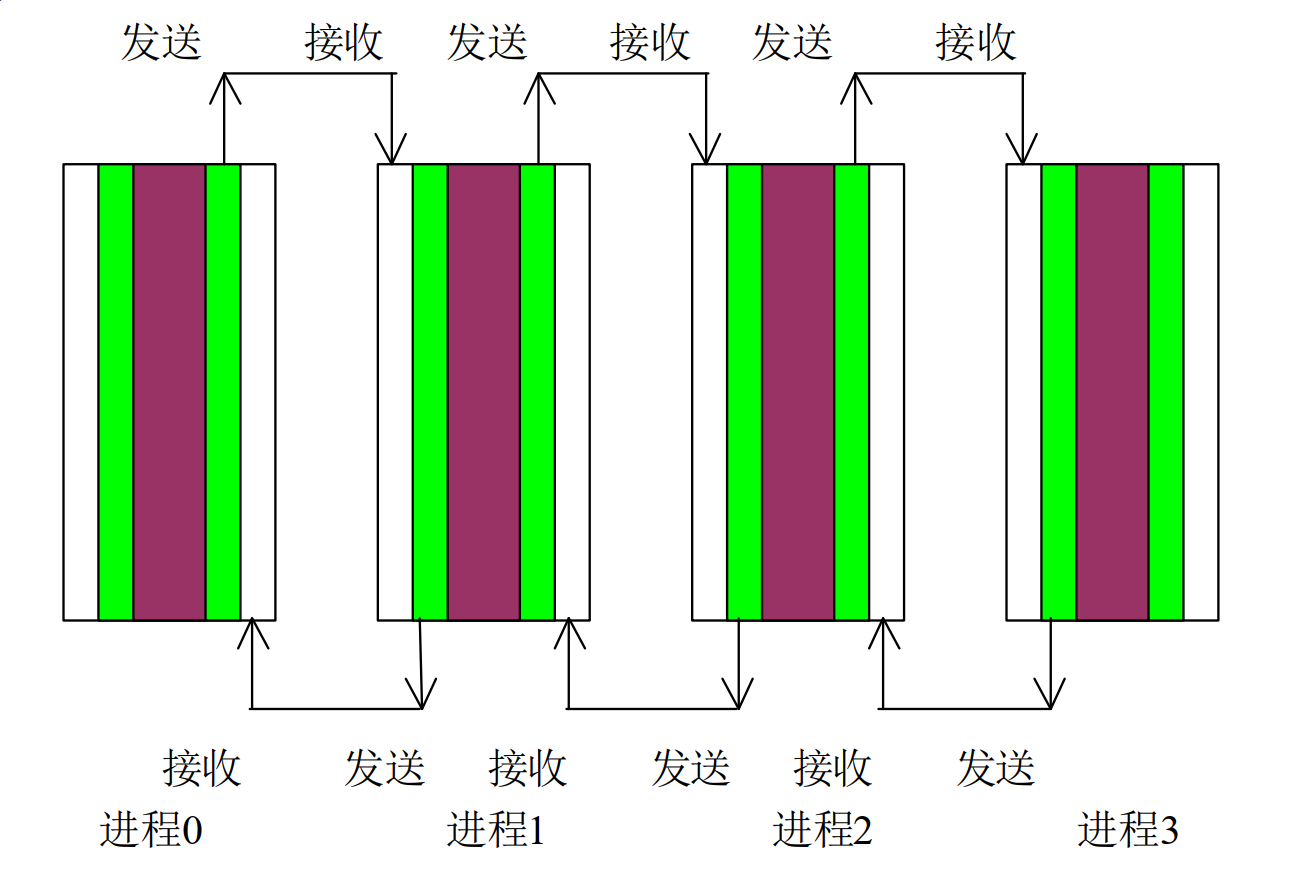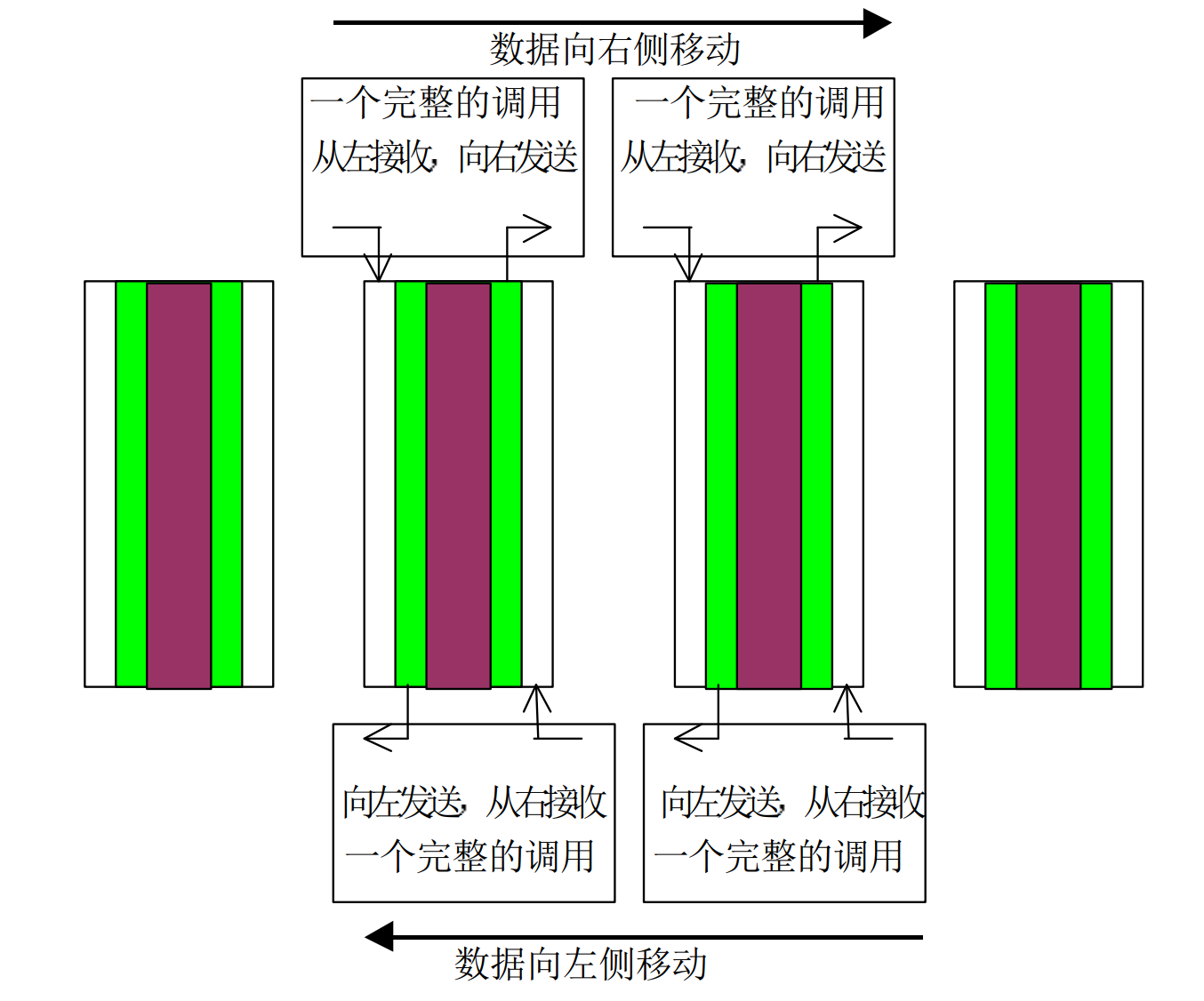MPI实现Jacobi
一、Jacobi迭代

#include<stdio.h>
#include<mpi.h>
#include<stdlib.h>
#define totalsize 16
#define mysize totalsize / 4
#define steps 10
int main(int argc, char** argv)
{
int rank, size, i, j, begin_col, end_col;
//除分块大小外,还包括左右两边各一列
float a[totalsize][mysize + 2], b[totalsize][mysize + 2];
float temp[totalsize];//临时数组
MPI_Status status;
MPI_Init(&argc, &argv);
MPI_Comm_size(MPI_COMM_WORLD, &size);
MPI_Comm_rank(MPI_COMM_WORLD, &rank);
printf("Process %d of %d is alive\n", rank, size);
//数组初始化
for (i = 0; i < totalsize; i++)
for (j = 0; j < mysize + 2; j++)
a[i][j] = 0;
if (rank == 0)
{
for (i = 0; i < totalsize; i++)
a[i][1] = 8.0;
}
if (rank == 3)
{
for (i = 0; i < totalsize; i++)
a[i][mysize] = 8.0;
}
for (i = 1; i < mysize + 1; i++)
{
a[0][i] = 8.0;
a[totalsize - 1][i] = 8.0;
}
//Jacobi 迭代
for (int n = 1; n <= steps; n++)
{
//从右边的邻居得到数据
if (rank < 3)
{
MPI_Recv(&temp[0], totalsize, MPI_FLOAT, rank + 1, 10, MPI_COMM_WORLD, &status);
for (i = 0; i < totalsize; i++)
a[i][mysize + 1] = temp[i];
}
//向左侧的邻居发送数据
if (rank > 0)
{
for (i = 0; i < totalsize; i++)
temp[i] = a[i][1];
MPI_Send(&temp[0], totalsize, MPI_FLOAT, rank - 1, 10, MPI_COMM_WORLD);
}
//向右侧的邻居发送数据
if (rank < 3)
{
for (i = 0; i < totalsize; i++)
temp[i] = a[i][mysize];
MPI_Send(&temp[0], totalsize, MPI_FLOAT, rank + 1, 10, MPI_COMM_WORLD);
}
//从左侧的邻居得到数据
if (rank > 0)
{
MPI_Recv(&temp[0], totalsize, MPI_FLOAT, rank - 1, 10, MPI_COMM_WORLD, &status);
for (i = 0; i < totalsize; i++)
a[i][0] = temp[i];
}
begin_col = 1;
end_col = mysize;
if (rank == 0) begin_col = 2;
if (rank == 3) end_col = mysize - 1;
for (i = 1; i < totalsize - 1; i++)
for (j = begin_col; j <= end_col; j++)
b[i][j] = 0.25 * (a[i][j + 1] + a[i][j - 1] + a[i + 1][j] + a[i - 1][j]);
for (i = 1; i < totalsize - 1; i++)
for (j = begin_col; j <= end_col; j++)
a[i][j] = b[i][j];
}
MPI_Barrier(MPI_COMM_WORLD);
printf("Process %d:\n", rank);
for (i = 0; i < totalsize; i++)
{
for (j = 1; j <= mysize; j++)
printf("%.2fP%d\t", a[i][j], rank);
printf("\n");
}
MPI_Finalize();
return 0;
}
二、用捆绑发送接收实现Jacobi 迭代

#include<stdio.h>
#include<mpi.h>
#include<stdlib.h>
#define totalsize 16
#define mysize totalsize / 4
#define steps 10
int main(int argc, char** argv)
{
int rank, size, i, j, begin_col, end_col;
//除分块大小外,还包括左右两边各一列
float a[totalsize][mysize + 2], b[totalsize][mysize + 2];
float temp[totalsize],temp1[totalsize];//临时数组
MPI_Status status;
MPI_Init(&argc, &argv);
MPI_Comm_size(MPI_COMM_WORLD, &size);
MPI_Comm_rank(MPI_COMM_WORLD, &rank);
printf("Process %d of %d is alive\n", rank, size);
//数组初始化
for (i = 0; i < totalsize; i++)
for (j = 0; j < mysize + 2; j++)
a[i][j] = 0;
if (rank == 0)
{
for (i = 0; i < totalsize; i++)
a[i][1] = 8.0;
}
if (rank == 3)
{
for (i = 0; i < totalsize; i++)
a[i][mysize] = 8.0;
}
for (i = 1; i < mysize + 1; i++)
{
a[0][i] = 8.0;
a[totalsize - 1][i] = 8.0;
}
//Jacobi 迭代
for (int n = 1; n <= steps; n++)
{
//从左向右平移数据
if (rank == 0)
{
for (i = 0; i < totalsize; i++)
temp[i] = a[i][mysize];
MPI_Send(&temp[0], totalsize, MPI_FLOAT, rank + 1, 10, MPI_COMM_WORLD);
}
else if (rank == 3)
{
MPI_Recv(&temp[0], totalsize, MPI_FLOAT, rank - 1, 10, MPI_COMM_WORLD, &status);
for (i = 0; i < totalsize; i++)
a[i][1] = temp[i];
}
else
{
for (i = 0; i < totalsize; i++)
temp[i] = a[i][1];
MPI_Sendrecv(&temp[0], totalsize, MPI_FLOAT, rank - 1, 10, &temp1[0], totalsize, MPI_FLOAT, \
rank + 1, 10, MPI_COMM_WORLD, &status);
for (i = 0; i < totalsize; i++)
a[i][1] = temp1[i];
}
//从右向左平移数据
if (rank == 0)
{
MPI_Recv(&temp[0], totalsize, MPI_FLOAT, rank + 1, 10, MPI_COMM_WORLD, &status);
for (i = 0; i < totalsize; i++)
a[i][mysize] = temp[i];
}
else if (rank == 3)
{
for (i = 0; i < totalsize; i++)
temp[i] = a[i][1];
MPI_Send(&temp, totalsize, MPI_FLOAT, rank - 1, 10, MPI_COMM_WORLD);
}
else
{
for (i = 0; i < totalsize; i++)
temp[i] = a[i][1];
MPI_Sendrecv(&temp[0], totalsize, MPI_FLOAT, rank + 1, 10, &temp1[0], totalsize, MPI_FLOAT, \
rank - 1, 10, MPI_COMM_WORLD, &status);
for (i = 0; i < totalsize; i++)
a[i][mysize] = temp1[i];
}
begin_col = 1;
end_col = mysize;
if (rank == 0) begin_col = 2;
if (rank == 3) end_col = mysize - 1;
for (i = 1; i < totalsize - 1; i++)
for (j = begin_col; j <= end_col; j++)
b[i][j] = 0.25 * (a[i][j + 1] + a[i][j - 1] + a[i + 1][j] + a[i - 1][j]);
for (i = 1; i < totalsize - 1; i++)
for (j = begin_col; j <= end_col; j++)
a[i][j] = b[i][j];
}
MPI_Barrier(MPI_COMM_WORLD);
printf("Process %d:\n", rank);
for (i = 0; i < totalsize; i++)
{
for (j = 1; j <= mysize; j++)
printf("%.2fP%d\t", a[i][j], rank);
printf("\n");
}
MPI_Finalize();
return 0;
}
矩阵乘
#include <stdio.h>
#include "mpi.h"
#include <string.h>
#include <stdlib.h>
#include <math.h>
#include <time.h>
#define SIZE 5
//生成随机矩阵
int** generate_matrix(int size)
{
int num = 0, m;
int** matrix;
matrix = (int**)malloc(sizeof(int*) * size);
for (m = 0; m < size; m++)
matrix[m] = (int*)malloc(sizeof(int) * size);
int i, j;
srand(time(NULL) + rand());
for (i = 0; i < size; i++)
{
for (j = 0; j < size; j++)
{
matrix[i][j] = rand() % 20;
}
}
return matrix;
}
//输出矩阵
void print_matrx(int** a, int size)
{
int i, j;
for (i = 0; i < size; i++)
{
for (j = 0; j < size; j++)
{
printf("%d ", a[i][j]);
}
printf("\n");
}
printf("\n");
}
//矩阵相乘([参考](https://blog.csdn.net/qq_35614920/article/details/80570839))
int* Multiplication(int** a, int b[], int size)
{
int* result;
result = (int*)malloc(sizeof(int) * size);
int i, m, n, sum = 0;
for (m = 0; m < size; m++)
{
for (n = 0; n < size; n++)
{
sum += a[n][m] * b[n];
}
result[m] = sum;
sum = 0;
}
return result;
}
int main(int argc, char** argv)
{
int size, rank, dest;
MPI_Comm comm = MPI_COMM_WORLD;
MPI_Status status;
MPI_Init(&argc, &argv);
MPI_Comm_size(comm, &size);
MPI_Comm_rank(comm, &rank);
int** matrix1;
int** matrix2;
int send_buff[SIZE* SIZE];
matrix1 = generate_matrix(size);
matrix2 = generate_matrix(size);
if (rank == 0)
{
printf("matrix1 is :\n");
print_matrx((int**)matrix1, size);
printf("matrix2 is :\n");
print_matrx((int**)matrix2, size);
int j, k, tmp = 0;
for (j = 0; j < size; j++)
for (k = 0; k < size; k++)
{
send_buff[tmp] = matrix1[j][k];
tmp++;
}
}
int rbuf[SIZE];
int* result;
result = (int*)malloc(sizeof(int) * size);
//分发列
MPI_Scatter(send_buff, size, MPI_INT, rbuf, size, MPI_INT, 0, comm);
result = Multiplication((int**)matrix2, rbuf, size);
MPI_Barrier(comm);//等待所有进程计算结束
int* recv_buff;
recv_buff = (int*)malloc(sizeof(int) * size * size);
MPI_Barrier(comm);
MPI_Gather(result, size, MPI_INT, recv_buff, size, MPI_INT, 0, comm);//收集各列数据
//根进程进行输出
if (rank == 0)
{
printf("\nresult is :\n");
int m, n, tmp = 0;
for (m = 0; m < size; m++)
{
for (n = 0; n < size; n++)
{
printf("%d ", recv_buff[tmp]);
tmp++;
}
printf("\n");
}
printf("\n");
}
MPI_Finalize();
return 0;
}
MPI实现Jacobi的更多相关文章
- 雅克比迭代算法(Jacobi Iterative Methods) -- [ mpi , c++]
雅克比迭代,一般用来对线性方程组,进行求解.形如: \(a_{11}*x_{1} + a_{12}*x_{2} + a_{13}*x_{3} = b_{1}\) \(a_{21}*x_{1} + a_ ...
- 【MPI学习4】MPI并行程序设计模式:非阻塞通信MPI程序设计
这一章讲了MPI非阻塞通信的原理和一些函数接口,最后再用非阻塞通信方式实现Jacobi迭代,记录学习中的一些知识. (1)阻塞通信与非阻塞通信 阻塞通信调用时,整个程序只能执行通信相关的内容,而无法执 ...
- 【MPI学习2】MPI并行程序设计模式:对等模式 & 主从模式
这里的内容主要是都志辉老师<高性能计算之并行编程技术——MPI并行程序设计> 书上有一些代码是FORTAN的,我在学习的过程中,将其都转换成C的代码,便于统一记录. 这章内容分为两个部分: ...
- 查找素数Eratosthenes筛法的mpi程序
思路: 只保留奇数 (1)由输入的整数n确定存储奇数(不包括1)的数组大小: n=(n%2==0)?(n/2-1):((n-1)/2);//n为存储奇数的数组大小,不包括基数1 (2)由数组大小n.进 ...
- kmeans算法并行化的mpi程序
用c语言写了kmeans算法的串行程序,再用mpi来写并行版的,貌似参照着串行版来写并行版,效果不是很赏心悦目~ 并行化思路: 使用主从模式.由一个节点充当主节点负责数据的划分与分配,其他节点完成本地 ...
- MPI Maelstrom - POJ1502最短路
Time Limit: 1000MS Memory Limit: 10000K Description BIT has recently taken delivery of their new sup ...
- MPI之求和
// MPI1.cpp : 定义控制台应用程序的入口点. // #include "stdafx.h" #include "mpi.h" #include &l ...
- VS2012下配置MPI
并行处理结课实验,要用到MPI编程,我的电脑和VS2012都是64位的,以为MPICH也得是64位才行,结果饶了很大的弯——配置正确,添加引用之后,仍然无法识别MPI函数. 后来换了个32位的MPIC ...
- MPI+WIN10并行试运行
系统:2015 win10专业版 x64 MPI安装包:mpich2-1.4.1p1-win-x86-64.man 将后缀改为.msi 以管理员身份安装 安装过程一路默认,注意<behappy为 ...
随机推荐
- [转]17个常用的JVM参数
作者:SimpleSmile_5177 来源:https://www.cnblogs.com/Simple-Object/p/10272326.html 前言 大家都知道,jvm在启动的时候,会执行默 ...
- springMVC请求路径 与实际资源路径关系
个人理解: 请求路径可以分为两部分:不通过springmvc转发的url:通过springmvc转发的url: 通过特定的配置,告诉springmvc哪些url需要从springmvc处理,处理后再跳 ...
- 【BZOJ1426】收集邮票 题解 (期望)
题目:有n种不同的邮票,皮皮想收集所有种类的邮票.唯一的收集方法是到同学凡凡那里购买,每次只能买一张,并且买到的邮票究竟是n种邮票中的哪一种是等概率的,概率均为1/n.但是由于凡凡也很喜欢邮票,所以皮 ...
- 关于海思SDK在Ubuntu下安装错误问题
在Ubuntu下安装海思sdk时,直接运行安装脚本,会有如下提示: ./sdk.unpack ./sdk.unpack: 2: ./sdk.unpack: source: not found ./s ...
- java_流程控制语句、权限修饰符
判断语句 if语句第一种格式: if if(关系表达式){ 语句体; } if语句第二种格式: if…else if(关系表达式) { 语句体1; } else { 语句体2; } if语句第三种格式 ...
- 题解 洛谷 P3332
题目描述 权值线段树套线段树板子题 首先观察题目,判断为二维偏序问题 操作1为区间修改,所以一定是外部线段树维护权值,内部线段树维护所在区间,否则时间复杂度爆炸qwq 为方便查找,哈希时我采用哈希每个 ...
- 图论算法(一)存图与STL第六弹——vector容器
图论算法(一)存图 我发现我的博客阅读量贼低,问小伙伴们,ta们都说这些博客太长了QAQ! 今天来个短亿点的(也短不了多少……) 进入正题,图论究竟是什么? 图论就是给你一张图,让你在这张图上进行各种 ...
- 浏览器自动化的一些体会4 webBrowser控件之零碎问题2
1. DocumentCompleted的多次执行问题 有的网页,会多次触发DocumentCompleted事件,由于它是异步的,不会阻塞,所以如果不恰当处理,会造成某些代码被错误地多次执行,造成意 ...
- python 3.7 jupyter中安装 docx报错
from docx import Document报错: Import Error: No module named ‘exceptions‘ 解决办法: 使用下面的命令重新安装docx !pip i ...
- 企业项目实战 .Net Core + Vue/Angular 分库分表日志系统 | 前言
介绍 大家好我是初久,一名从业4年的.Net开发攻城狮,从今天开始我会和大家一起对企业开发中常用的技术进行分享,一方面督促自己学习,一方面也希望大家可以给我指点出更好的方案,我们一起进步. 项目背景 ...
